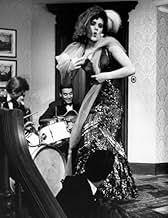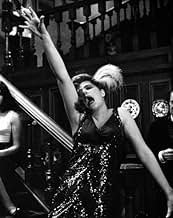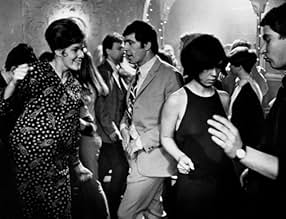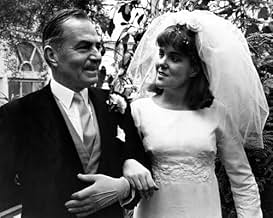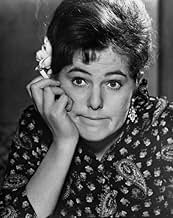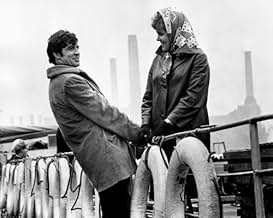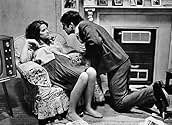AVALIAÇÃO DA IMDb
6,9/10
4,5 mil
SUA AVALIAÇÃO
Adicionar um enredo no seu idiomaA young woman juggles an unwanted suitor's advances and her desire for an exciting life, envying her free-spirited roommate's social whirlwind.A young woman juggles an unwanted suitor's advances and her desire for an exciting life, envying her free-spirited roommate's social whirlwind.A young woman juggles an unwanted suitor's advances and her desire for an exciting life, envying her free-spirited roommate's social whirlwind.
- Direção
- Roteiristas
- Artistas
- Indicado a 4 Oscars
- 6 vitórias e 17 indicações no total
Jolyon Booth
- Registry Office Clerk
- (as Jolyan Booth)
Lewis Alexander
- Party Guest
- (não creditado)
Jack Arrow
- Party Guest
- (não creditado)
Richard Atherton
- Waiter
- (não creditado)
Roy Beck
- Party Guest
- (não creditado)
Hyma Beckley
- Party Guest
- (não creditado)
Avaliações em destaque
... it's because it is. But you have to look at the year it was made - 1966. The top film at the box office that year was "The Bible", but the #3 movie was "Who's Afraid of Virginia Woolf?". So society and its values were definitely in transition, even in confusion.
The plot is centered on Georgy (Lynn Redgrave), a twenty-something working class British girl who is portrayed as overweight and plain when I think she is adorable. She's on a voyage of self-discovery, but ultimately finds that she's most fulfilled in service to others, in particular her roommate's infant child who is abandoned at birth, and whose care she enthusiastically takes up. This might have been a sweeter tale than it is if not for HOW Georgy manages to keep the child and support her, made especially puzzling by the closing rendition of the title song that infers that this is supposed to be a happy ending! To find out what she did you'll have to watch this yourself. This film was considered controversial for its time, dealing with promiscuity, abortion, hedonism, child abandonment, and classism.
This movie might have even had trouble being made in the US at the time, and it for sure had difficulty with some local TV station managers that considered it unsuitable even five years later. I know that in my hometown, Dallas, no TV station manager would air it as late as the early 70s. If you think that's odd, do realize that the local Dallas ABC affiliate wouldn't air NYPD Blue during its first season in the early 90s because station management considered it obscene!
If you do decide to watch it, remember it's definitely not a comedy though it has comic moments.
The plot is centered on Georgy (Lynn Redgrave), a twenty-something working class British girl who is portrayed as overweight and plain when I think she is adorable. She's on a voyage of self-discovery, but ultimately finds that she's most fulfilled in service to others, in particular her roommate's infant child who is abandoned at birth, and whose care she enthusiastically takes up. This might have been a sweeter tale than it is if not for HOW Georgy manages to keep the child and support her, made especially puzzling by the closing rendition of the title song that infers that this is supposed to be a happy ending! To find out what she did you'll have to watch this yourself. This film was considered controversial for its time, dealing with promiscuity, abortion, hedonism, child abandonment, and classism.
This movie might have even had trouble being made in the US at the time, and it for sure had difficulty with some local TV station managers that considered it unsuitable even five years later. I know that in my hometown, Dallas, no TV station manager would air it as late as the early 70s. If you think that's odd, do realize that the local Dallas ABC affiliate wouldn't air NYPD Blue during its first season in the early 90s because station management considered it obscene!
If you do decide to watch it, remember it's definitely not a comedy though it has comic moments.
Reviews seem to miss the real theme of this film, which is about the voyage of self-discovery of a person who feels out of sync with her world and tries to define, or redefine, her own true self. This theme has a strange attraction for me -- I identify with Georgy's search, I think, because of my own feelings of misalignment with the world or alienation. Unfortunately, as a male, it seems that the principal characters in films addressing this theme with sensitivity are invariably women. Perhaps in our society men are expected not to have such uncertainties about themselves or to suppress them, so no films are made. Two other films I enjoyed because of their similar themes are "Muriel's Wedding" and "Thelma and Louise". If you like, you can tell me I'm reading far more into this film than was ever intended, reminiscent of Mark Twain's famous warning. But you won't convince me! Alan
Alan Bates' eccentric performance outshines in this interesting and whimsical film. It is certainly an odd mix of drama and comedy as Bates never seems to act seriously around what essentially is a perverse story with cutting moments, particularly Charlotte Rampling's performance in the hospital after her baby is born. Redgrave is perfect as the dowdy and shy Georgie - like her description in the book, she appears plain but strangely attractive. Mason again appears as the downtrodden anti-hero, never quite getting what he wants at the end of the film - in this respect he always seems typecast. There's always something I like about these B/W 1960's films with their gritty London location filming and this one is no exception.
Good performances from Redgrave, Mason, Rampling and Bates. A modest film that found international approval. In 1966, while it may have seemed shocking to hear UK girl Charlotte Rampling tell Alan Bates that she had "destroyed" two of his already, it's worth remembering that an American girl couldn't have a legal abortion unless there were extenuating circumstances. Roe v. Wade was still several years away. The wholesome longings of Goergie are sharply contrasted with her roommate, the ice cold Meredith. The lead was originally offered to Vanessa Redgrave and when she backed out her younger sister Lynne was cast. She was overwhelmingly brave playing Georgie as a girl you liked enough that when she does something embarrassing you can't help but flinch. It happens a lot. As she falls and fails she finds a life of her own. And that is oddly inspirational.
I watched this movie mostly for Lynn Redgrave, expecting nothing more than an old, light-hearted British comedy. It was better than I expected; "Georgy Girl" is a lovely, bittersweet dramedy clearly inspired by American screwball comedies of the 30's and the French New Wave that was burning in the 60's (to see how much the Nouvelle Vague aesthetics influenced British cinema, check the also remarkable "Two for the Road", with Albert Finney and Audrey Hepburn).
Redgrave, fantastic as usual, plays Georgy, a scatter-brained working-class virgin with a golden heart. She shares a flat with a selfish, cold bitch (Charlotte Rampling), who gets pregnant of Jos (Alan Bates), and the three of them eventually move together; but things get complicated as Georgy is courted by Jos and James (James Mason), a much older man, at the same time.
Bates (is it just me, or does he look like Jean-Paul Belmondo - one of the greatest Nouvelle Vague icons because of Godard's "Breathless" - in this?), Rampling and Mason are all great in their respective parts, but this is Redgrave's show all the way. Her anti-heroine is sweet and memorable, somewhat similar to Toni Collette's Muriel Heslop (from "Muriel's Wedding"), some sort of a British, less patient and clumsier Amélie Poulain (Audrey Tautou). Georgy singing "Whole Lotta Woman" is a classic scene. Lynn's performance alone would make this movie worth seeing, but she's not the only good thing about it, just the core. 10/10.
Redgrave, fantastic as usual, plays Georgy, a scatter-brained working-class virgin with a golden heart. She shares a flat with a selfish, cold bitch (Charlotte Rampling), who gets pregnant of Jos (Alan Bates), and the three of them eventually move together; but things get complicated as Georgy is courted by Jos and James (James Mason), a much older man, at the same time.
Bates (is it just me, or does he look like Jean-Paul Belmondo - one of the greatest Nouvelle Vague icons because of Godard's "Breathless" - in this?), Rampling and Mason are all great in their respective parts, but this is Redgrave's show all the way. Her anti-heroine is sweet and memorable, somewhat similar to Toni Collette's Muriel Heslop (from "Muriel's Wedding"), some sort of a British, less patient and clumsier Amélie Poulain (Audrey Tautou). Georgy singing "Whole Lotta Woman" is a classic scene. Lynn's performance alone would make this movie worth seeing, but she's not the only good thing about it, just the core. 10/10.
Você sabia?
- CuriosidadesVanessa Redgrave backed out of the role of Georgy just before shooting started. Her sister Lynn picked up the part instead.
- Erros de gravaçãoIn the early scene at the piano where Georgy's father has brought her a dress to wear to a birthday party, she's wearing glasses when he starts to say, "Oh, please yourself," but not wearing them before he finishes the line.
- ConexõesFeatured in The Lady with the Torch (1999)
Principais escolhas
Faça login para avaliar e ver a lista de recomendações personalizadas
Detalhes
- Data de lançamento
- País de origem
- Idiomas
- Também conhecido como
- Georgy Girl
- Locações de filme
- Dame Clara Butt House, 7 Harley Road, London, Greater London, Inglaterra, Reino Unido(James Leamington's mansion)
- Empresa de produção
- Consulte mais créditos da empresa na IMDbPro
Bilheteria
- Orçamento
- US$ 400.000 (estimativa)
- Tempo de duração
- 1 h 39 min(99 min)
- Cor
Contribua para esta página
Sugerir uma alteração ou adicionar conteúdo ausente


